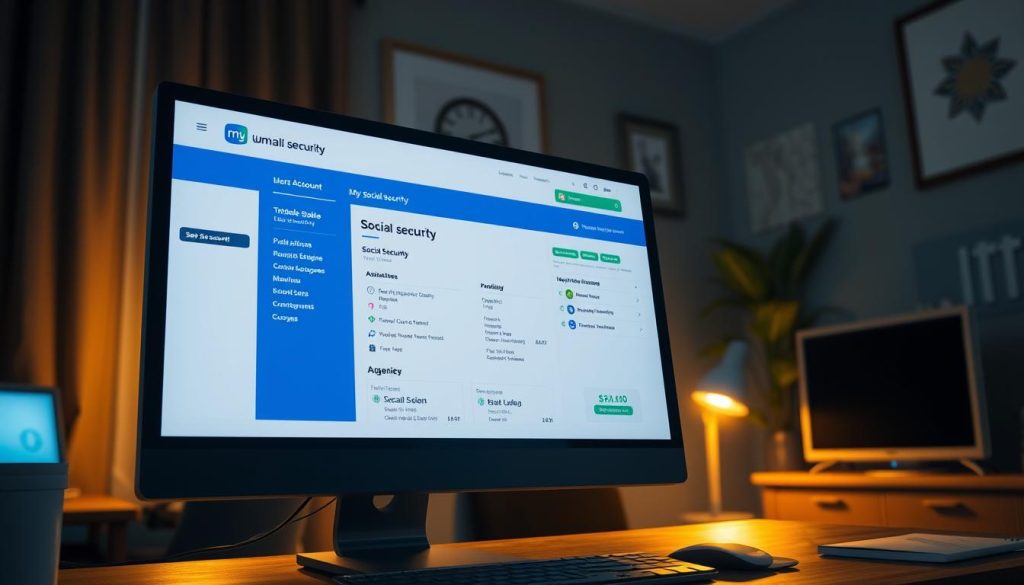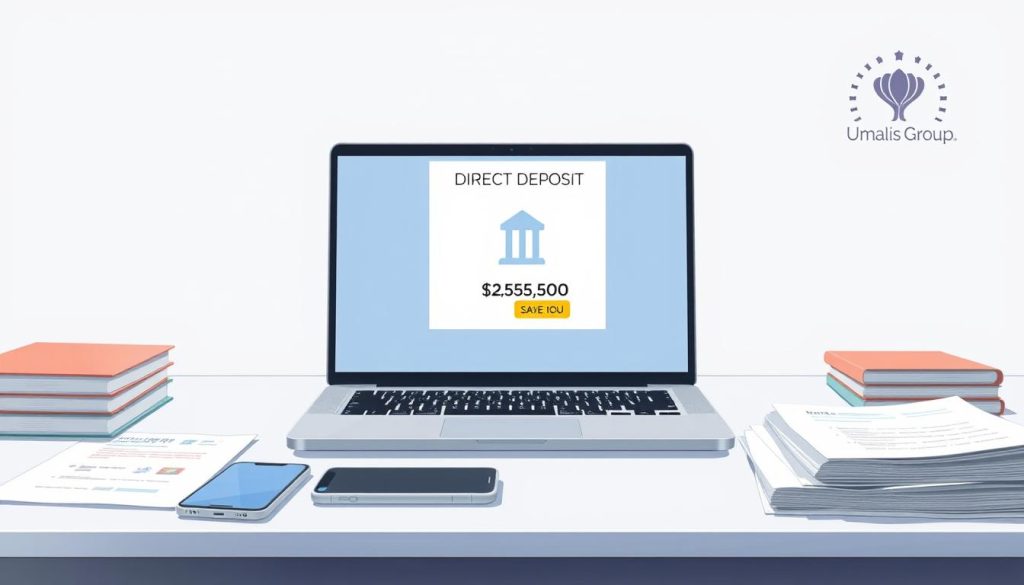Did you know that nearly one in three independent professionals with cross-border ties face unexpected gaps in retirement or health coverage? This guide makes those stakes clear and gives you a practical roadmap to protect your career and income.
As an independent worker in France, you balance national insurance systems and U.S. obligations. We explain how social security supports your career from record setup to claiming benefits.
We show where French insurance and U.S. programs differ, and what steps help you stay compliant abroad. You will learn which online tools on the official website help you find information fast, and which forms or registration steps require in-person proof.
Practical aims: preserve your entitlements, avoid delays, and maintain secure records. This page centralizes key steps, contacts, and timelines so you can plan with confidence.
Table of Contents
Key Takeaways
- Understand how social security and French insurance intersect for independent workers.
- Learn which benefits you can claim and which require specific documentation.
- Use the official website to access forms and find information quickly.
- Follow clear registration steps to avoid processing delays.
- Keep records updated to protect your entitlements and minimize risk.
What independent workers in France need to know about Social Security
Independent professionals in France must register with local health authorities to secure basic medical coverage.
Coverage basics: A French employment signatory contributes to general health insurance, which typically reimburses about 70% of medical costs for the insured and attached children under 18. EU nationals should file form S1106 (cerfa n°15763*02) with their CPAM.
Prepare your file: include a completed S1106, passport or ID, birth certificate showing filiation, your work contract, first payslip or employer certificate, proof of address (under 3 months), and a RIB (bank details).
Spouses and adult children who work must register from day one. Non-working family members may register after three months’ residence with supporting proof. Children under 18 are attached via form S3705.
« Keeping documents accurate and up to date speeds processing and protects your entitlements. »
- Keep a digital folder of receipts and correspondence.
- Use EHIC during the first months before full affiliation.
- Contact your local CPAM if you need help with the registration process.
U.S. Social Security vs. French social security: scope, rights, and coverage
For freelancers working between the U.S. and France, knowing which system covers what prevents surprise gaps. U.S. social security focuses on retirement, disability, and survivors benefits. French insurance through CPAM centers on healthcare access and reimbursements.
CPAM registration is document-driven. EU nationals should file form S1106 (cerfa n°15763*02) and attach the required documents. Submit a valid passport or ID, a birth certificate showing filiation, proof of residence under three months, and a RIB (bank details).
Spouses and adult children who work must register separately. Non-working family members may register after three months’ residence. Children under 18 are attached via form S3705.
« Keep precise, legible paperwork and updated proof of residence to speed processing and protect your entitlements. »
Practical notes: keep copies of your registration certificate and bank details. Visit the CPAM website and the specific page for S1106 to confirm the current form version and required attachments.
| Program | Primary scope | Key documents | Who to contact |
|---|---|---|---|
| U.S. social security | Retirement, disability, survivors | Work records, earnings statements | U.S. Social Security Administration |
| French CPAM | Healthcare coverage and reimbursements (~70% typical) | Passport, birth certificate, proof of residence, RIB, work contract or payslip | Local CPAM office / CPAM website |
| Family registration | Dependent rights based on employment and residence | S3705 for children under 18; separate registration for working adults | CPAM guidance page |
Social Security benefits you may qualify for
Understanding your eligibility for federal benefits helps you plan income and family protection while living in France.
Four main program areas cover most cases: retirement benefits, Social Security Disability Insurance (SSDI), Supplemental Security Income (SSI), and survivors or auxiliary payments for spouses and dependents. Each program has its own rules, required documentation, and timelines.
Retirement, SSDI, SSI, and survivors
Retirement: based on work credits and claiming age. Delaying can raise monthly benefits.
SSDI: requires medical evidence and sufficient work history.
SSI: targets limited income and resources; gather financial records early.
Survivors: provide security benefits for eligible spouses and children.
How and when benefits are paid
Payments are scheduled by your birthdate. If a payment is more than three days late, contact the agency promptly to avoid complications.
- Use a free online account to update name/address, set up direct deposit, check application status, and download tax documents.
- Direct deposit is the most reliable delivery method to prevent mailed-check delays.
- Keep clear records of correspondence and notices to speed appeals or verifications.
- Use the official website for reliable information and benefit modeling tools.
| Program | Main focus | Key action | Where to find info |
|---|---|---|---|
| Retirement | Monthly income based on earnings | Confirm work credits and choose claiming age | Official website / my account |
| SSDI | Disability with work credits | Submit thorough medical records | Local field office / website |
| SSI | Needs-based cash support | Prepare income and asset documentation | Benefit program pages on website |
| Survivors | Support for family members | Verify eligibility and dependent status | Agency guidance pages |
Create and access your my Social Security account from abroad
If you live abroad, you can establish a secure federal account without a U.S. mailing address.
Effective August 11, 2023: many expatriates can create a my Social Security account by verifying identity with ID.me. This change expands reliable access for independent professionals based in France.

Follow these steps on the official website page: go to ssa.gov/myaccount, select Create an Account, choose Sign in with ID.me, then Create an ID.me account. In Verify Your Identity pick “I don’t live in the United States” and follow the prompts.
Using ID.me without a U.S. mailing address (effective August 11, 2023)
If you already had an account, add ID.me credentials to regain international access. The process links your prior profile to the new verification method and preserves your records.
What you can do online
- Benefit verification: download proof quickly for French institutions.
- Set up or update direct deposit to avoid payment delays.
- Change your address or name and find tax documents on demand.
- Check application status and manage notifications in one place.
« Use the website prompts carefully — they guide you to complete each step correctly. »
For detailed help, visit the account page or contact the social security administration through its online contact options. Maintain strong device security and protect your ID.me credentials to keep your account safe.
Apply for a Social Security number for a child under 12
Start early and be precise. For a child under age 12, mail a completed SS-5-FS (see page 5) with required evidence to the Federal Benefits Unit at: U.S. Embassy, FBU, 4 Avenue Gabriel, 75382 Paris Cedex 08, France.
Where to post the SS-5-FS and which originals to include
If you live in France, include originals of documents. Do not mail originals from other countries to Paris.
Swiss residents must have originals certified by the U.S. Embassy in Bern and send certified copies to Paris. Residents in African countries served by the FBU Paris must obtain certified copies from their local U.S. Embassy or Consulate before mailing.
Evidence required: age, citizenship, identity, and prepaid return envelope
You must complete the form legibly and sign it. Incomplete entries are a common cause of delays.
- Evidence of age/birth: U.S. birth certificate, Consular Report of Birth Abroad made before age 5, or local birth record.
- Evidence of U.S. citizenship: U.S. passport, U.S. birth certificate, Consular Report of Birth Abroad, Certificate of Citizenship, or Certificate of Naturalization.
- Evidence of identity: current signed U.S. passport, or French/Swiss passport or French ID card.
- Enclose a prepaid, self‑addressed envelope valid in France (Chronopost, Colissimo, Lettre suivie, or Lettre recommandée avec AR) so the card and originals can be returned safely.
« Keep tracked postage and copies of every document you send; they are indispensable for follow-up. »
Practical notes: include residence context where relevant and use secure mailing with tracking. Retain copies of the application and all documents you post.
Apply for a Social Security number for yourself or a child 12 and older
For first-time applicants aged twelve and above, an embassy visit is mandatory to complete the application process. You must appear in person so staff can verify identity at the required level.
In-person appointment requirements and acceptable documents
Book an appointment: in France email fbu.paris@ssa.gov. In Switzerland contact the U.S. Embassy in Bern. For African countries served by the Paris office, follow local embassy certification rules before mailing.
Bring originals for age, citizenship, and identity. Acceptable documents include a passport, U.S. birth certificate, Consular Report of Birth Abroad, or naturalization/citizenship certificate. Bring the completed SS-5-FS form and photocopies to speed processing.
Proving residence outside the U.S. and country-specific notes
If you were born in the United States, provide clear proof of residence outside the U.S. to explain why no number was previously issued.
- Acceptable proofs: vaccination booklets, school records, payslips, French relevé de carrière, or relevé d’imposition.
- For African countries, have originals certified locally and send certified copies with the form to Paris Cedex when instructed.
- Embassy staff will keep photocopies and return originals; keep duplicates for your file.
« Arrive with complete documents and your appointment confirmation; embassy access procedures can add time to your visit. »
Replace a lost Social Security card or recover your Social Security Number
A missing card or unknown number requires prompt, precise action. Submit a completed SS-5-FS with an acceptable original identity document. Do not mail photocopies in place of originals.
If you live in France, mail originals and a prepaid return envelope to: U.S. Embassy, FBU, 4 Avenue Gabriel, 75382 Paris Cedex 08, France. Confirm the address exactly to avoid delays.
Country rules differ. Swiss residents must obtain certified copies from the U.S. Embassy in Bern. Residents in African countries served by FBU Paris should have originals certified locally and send certified copies as instructed.
Identity, application, and name issues
Acceptable ID includes a current signed U.S. passport, permanent resident card, or U.S. driver’s license. A French or Swiss passport may be accepted when paired with proof of U.S. citizenship (for example, a U.S. birth record).
« If your name differs from SSA records, complete the name change process before you post the file. »
- Use the official website to download the SS-5-FS form and check current identity rules.
- Expect processing to take at least one month; expedited service is not available.
- Keep copies of all documents and a checklist; save any reply letter you receive.
| Step | What to include | Where to post |
|---|---|---|
| Apply | Completed SS-5-FS, original ID, birth evidence if needed | FBU Paris, 4 Avenue Gabriel, 75382 Paris Cedex 08, France |
| Country-specific rule | Swiss: certified copies from Bern; Africa: local embassy certification | Follow local embassy guidance before posting |
| Return | Prepaid, tracked return envelope to safeguard originals | Included with your post |
Payments, direct deposit, and non-receipt of social security benefits
Timely receipt of benefits depends on correct bank details and a current address on file. We recommend checking both each month to avoid interruptions.

Direct deposit updates and late payments
If you get paper checks, wait until after the 25th of the month before reporting non-receipt. For bank deposits, contact your bank first. If funds are still missing by the 10th, notify the office.
Foreign Enforcement Questionnaire and suspensions
Benefits may be suspended in February if the agency does not receive the Foreign Enforcement Questionnaire. To reinstate, post the correct form: SSA-7162 for beneficiaries or SSA-7161 for representative payees to:
- Federal Benefits Unit‑FEQUS, U.S. Embassy, 4 Avenue Gabriel, 75008 Paris, France.
Change of address and name updates
For moves abroad over three months, submit the required form and update your address promptly. Moving from the U.S. overseas usually requires SSA-21.
Name changes need SS-5-FS plus identity, proof of U.S. citizenship, and legal evidence (marriage certificate, divorce decree, or court order). Include a prepaid, self-addressed envelope when you post originals to:
- U.S. Embassy‑FBU, 4 Avenue Gabriel, 75382 Paris Cedex 08, France.
« Keep a monthly checklist to confirm deposits and log exceptions; complete packages reduce follow-up letters and delays. »
For frequently asked questions, consult the online resources first. If you still need help, call during posted hours: Tuesday and Thursday, 9am–12pm.
Medicare enrollment or termination while residing in France
Managing Medicare while residing in France requires clear steps and timely mailing. We outline the documents to post, the address to use, and practical tips to avoid delays.
How to enroll or stop Part B from abroad
To enroll during the General Enrollment Period (January 1–March 31), complete form CMS-40B and mail it to:
U.S. Embassy‑FBU, 4 Avenue Gabriel, 75382 Paris Cedex 08, France.
To terminate Part B, send a signed statement requesting termination. Include your name, current address, date of birth, and SSN. Mail the statement to the same address.
« Post documents with tracking and keep copies; international mail adds extra weeks to processing. »
| Action | Required document | Key tip |
|---|---|---|
| Enroll (GEP) | CMS-40B completed | Verify all fields; include SSN |
| Terminate Part B | Signed termination statement | Match details to SSA records |
| Planning | Proof of French insurance | Check months for effective dates |
Review official website pages for the latest information on premiums and effective months. Align U.S. insurance choices with French coverage before you post documents. When in doubt, email for a quick pre-check to save months of corrections.
Windfall Elimination Provision and Government Pension Offset
Some pensions earned outside the federal system can change how much you or your spouse receive from U.S. benefits.
The Windfall Elimination Provision (WEP) may reduce your retirement or disability calculation if you also receive a non-covered pension. Know your exposure early so you can plan cash flow and claiming strategies.
The Government Pension Offset (GPO) can lower spousal or survivors payments when a non-covered government pension exists. Assess the household impact before you file to avoid surprises.
- Model outcomes: use the social security administration website page to estimate how WEP and GPO change amounts.
- Document everything: keep complete pension and earnings histories for appeals or recalculations.
- Treaties matter: review agreement france and bilateral social security rules if you worked in both systems.
Track legislative updates such as the Social Security Fairness Act. Changes could change future calculations, so request written estimates and coordinate with advisors who understand bilateral social dynamics.
« Request written estimates so you can compare outcomes and select optimal claiming strategies. »
| Issue | Who it affects | Action |
|---|---|---|
| WEP | Workers with non‑covered pensions | Model reductions; preserve earnings records |
| GPO | Spouses and survivors with non‑covered pensions | Estimate household loss; consider filing timing |
| Treaty interaction | Cross‑border workers (France included) | Check agreement france rules; consult FBU or advisor |
Federal Benefits Unit Paris: contact, appointments, and outreach events
The Federal Benefits Unit in Paris handles U.S. retirement and claims for beneficiaries living in France and nearby countries.
Contact and mailing details: U.S. Embassy Federal Benefits Unit, 4 avenue Gabriel, 75382 Paris Cedex 08, France. Email: fbu.paris@ssa.gov. Tel: +33.1.43.12.27.05. Fax: +33.1.42.86.82.91.
Hours, appointment rules, and services
Calling hours: Tuesday and Thursday, 9am–12pm. Appointments are reserved for first-time SSN applicants aged 12 and older. To request one, email the unit and they will propose a date (usually afternoons).
All other services — claims, third party representative matters, post‑entitlement changes, and FEQ reinstatements — are handled by letter, email, fax, or phone.
September 2025 outreach schedule and booking
Outreach events (appointment-only) are scheduled for September 2025: Marseille (Sept 3–4), Rennes (Sept 9–10), Lyon (Sept 16–17), Bordeaux (Sept 23–24), Bern (Sept 23–25), Strasbourg (Sept 29–30).
Book events via Picktime. Each entry requires a scheduled appointment under your name. Check the event page on the website to find information on documentation and country-specific rules.
| Service | How to request | Which address to post | Expected processing |
|---|---|---|---|
| SSN applications (12+) | Appointment via email; bring originals | U.S. Embassy Federal Benefits Unit, 4 avenue Gabriel, 75382 Paris Cedex 08, France | In-person processing at appointment |
| FEQ reinstatement | Send SSA-7162 or SSA-7161 by post | Federal Benefits Unit‑FEQUS, U.S. Embassy, 4 Avenue Gabriel, 75008 Paris, France | Typically 6–8 months weeks after receipt |
| Post‑entitlement changes | Email with attachments or fax | Use Paris Cedex address for standard mail | Depends on form and bank update timing |
| Outreach event services | Booked on Picktime; limited slots | Event page lists local venue and post rules | Service on the scheduled date |
Practical tips: use the Paris Cedex address for routine mail and the FEQUS address for FEQ forms to accelerate handling. Prepare the correct form and documents before you post. If your name or bank changes, notify the unit promptly to preserve on-time deposits.
« Check the official page first to find information, then email with concise attachments to speed processing. »
Conclusion
Conclusion
A clear closing step: verify every application entry, match names on certificates, and save tracked post receipts. Keep copies of key documents—passport, birth certificate, and any completed form—so you can respond quickly to requests.
Maintain your online account and update your address, name, and bank details to protect timely benefits. If you are residing in France, align local registration with U.S. requirements and follow embassy posting rules when originals are needed.
For complex histories or bilateral cases, consult the administration or an advisor. Stay proactive: confirm filings, monitor deposits, and keep records organized to safeguard long‑term financial wellbeing.
FAQ
What should independent workers in France know about social programs and benefits?
Independent workers must register with the French health and pension system (CPAM for health). Keep identity documents, a birth certificate, proof of address, and a bank identity statement (RIB) ready. Confirm which bilateral agreements apply to your situation and track contribution deadlines to secure pension and healthcare coverage.
How do U.S. and French systems differ in scope and coverage?
The U.S. federal system provides retirement, disability, and survivors benefits based on work credits; France offers universal healthcare and contributory pensions through URSSAF and CNAV. Bilateral agreements can avoid double contributions and protect pension rights. Check eligibility rules for each benefit and how foreign residence affects entitlement.
How do I register with CPAM for myself and family members in France?
Apply to your local CPAM with a passport, birth certificate, proof of address, and RIB. If you have family members, include marriage or parental documents. Registration confirms access to healthcare reimbursements and links you to the French care network.
What documents does CPAM require?
Prepare a valid passport, original birth certificate, recent proof of address (utility bill or rental contract), and a RIB from a French bank. Originals may be requested for verification; bring certified translations if documents are not in French.
Which benefits might I qualify for from the U.S. system while living abroad?
U.S. benefits can include retirement pensions, disability benefits, survivor benefits, and Supplemental Security Income in limited cases. Eligibility depends on work credits, citizenship or lawful presence, and country-of-residence rules. Some payments may be restricted in certain countries.
When and how are benefits paid to recipients abroad?
Payments are typically monthly and can be sent by direct deposit to an international bank account. Delays can occur due to documentation or foreign bank processing. Keep your account and address details current to avoid interruptions.
How can I create or access my government account from France?
You can register online and verify your identity remotely using accepted providers. As of August 11, 2023, ID.me processes many verifications without a U.S. mailing address. Once your account is active, you can check payments, update direct deposit, and change contact information.
What can I do online once my account is set up?
Online services include benefit verification, changing direct deposit, updating your address and name, and requesting letters or statements. These functions reduce processing time and help maintain continuous payments while abroad.
How do I apply for a government number for a child under 12 from overseas?
Submit form SS-5-FS with original evidence of the child’s age, citizenship, and identity. Include a prepaid return envelope and mail to the designated overseas processing unit. Originals are returned after verification, so track the package and retain copies of everything sent.
Which documents prove a child’s eligibility for a number?
Acceptable proof includes the child’s birth certificate, passport, and documents showing citizenship. Also include parental identity and any custody or guardianship papers. Ensure documents are current and legible to prevent delays.
How do I apply for a number for someone aged 12 or older?
Applications for applicants 12 and over usually require an in-person appointment at a consular or designated office. Bring current photo ID, proof of citizenship, and evidence of overseas residence. Appointments confirm identity and allow staff to review originals.
How can I prove residence outside the United States, especially for France, Switzerland, or Africa?
Use utility bills, rental contracts, tax records, local registrations, or residence permits. For France, a « carte de séjour » or recent tax notice is useful. Different regions may accept varied documents, so check regional guidance before your appointment.
What do I need to replace a lost card or recover my number?
Complete form SS-5-FS, provide identity documents (passport or national ID), and include a return envelope. If replacing a card, confirm mailing instructions for overseas delivery. Keep copies of all paperwork and follow up if processing exceeds published timelines.
How do I update direct deposit or report missed payments from abroad?
Update banking details through your online account or by submitting required forms to the overseas service center. For missed payments, file an inquiry and, if requested, complete a Foreign Enforcement Questionnaire. Maintain proof of bank statements and correspondence.
What happens if I change my address or legal name while living in France?
Notify the agency promptly via your online account or by mail. Provide legal proof of the change—marriage certificate, court order, or official ID—and a French proof of address. Use the Paris Cedex mailing address when instructed for overseas documents.
How do I enroll or disenroll from Medicare while residing in France?
Use form CMS-40B to apply for enrollment from abroad or submit a Part B disenrollment request if your situation changes. Mail requests to the designated Medicare office handling international cases and include documentation proving your French residency.
What are the Windfall Elimination Provision and Government Pension Offset?
These rules can reduce U.S. benefit amounts when you receive a pension from employment not covered by U.S. taxes. WEP affects retirement benefits; GPO affects spousal or survivor benefits. Review your pension history and seek estimates before retirement planning.
How can I contact the Federal Benefits Unit in Paris for appointments or outreach?
The unit provides email, phone, and a mailing address for inquiries and appointments. They process claims, issue statements, and hold outreach events. Check official embassy or agency pages for current hours, appointment rules, and scheduled events through September 2025.
What should I bring to an appointment at the Federal Benefits Unit?
Bring original identity documents, proof of citizenship, proof of overseas residence, and any forms already completed. Prepare copies and a French bank RIB if you request direct deposit. Arrive early and verify required documents before your visit to avoid rescheduling.





